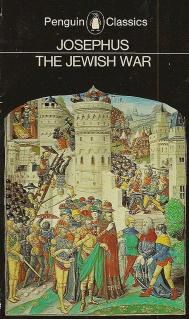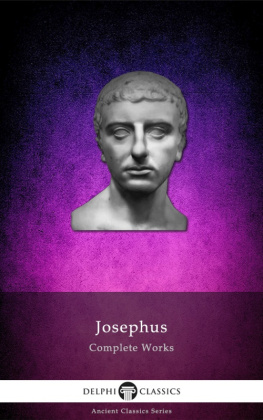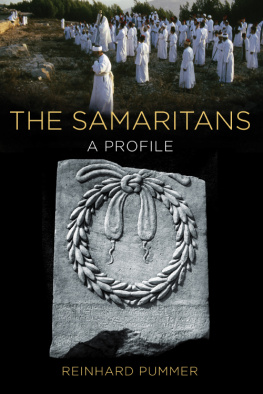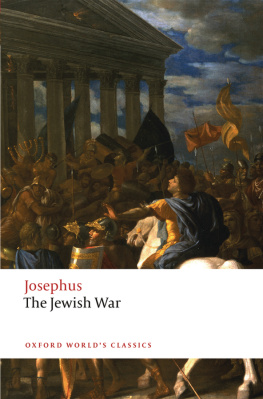Flavius Josephus - The Complete Works of Flavius Josephus
Here you can read online Flavius Josephus - The Complete Works of Flavius Josephus full text of the book (entire story) in english for free. Download pdf and epub, get meaning, cover and reviews about this ebook. year: 2014, publisher: Start Classics, genre: History. Description of the work, (preface) as well as reviews are available. Best literature library LitArk.com created for fans of good reading and offers a wide selection of genres:
Romance novel
Science fiction
Adventure
Detective
Science
History
Home and family
Prose
Art
Politics
Computer
Non-fiction
Religion
Business
Children
Humor
Choose a favorite category and find really read worthwhile books. Enjoy immersion in the world of imagination, feel the emotions of the characters or learn something new for yourself, make an fascinating discovery.
- Book:The Complete Works of Flavius Josephus
- Author:
- Publisher:Start Classics
- Genre:
- Year:2014
- Rating:5 / 5
- Favourites:Add to favourites
- Your mark:
- 100
- 1
- 2
- 3
- 4
- 5
The Complete Works of Flavius Josephus: summary, description and annotation
We offer to read an annotation, description, summary or preface (depends on what the author of the book "The Complete Works of Flavius Josephus" wrote himself). If you haven't found the necessary information about the book — write in the comments, we will try to find it.
The Complete Works of Flavius Josephus — read online for free the complete book (whole text) full work
Below is the text of the book, divided by pages. System saving the place of the last page read, allows you to conveniently read the book "The Complete Works of Flavius Josephus" online for free, without having to search again every time where you left off. Put a bookmark, and you can go to the page where you finished reading at any time.
Font size:
Interval:
Bookmark:
1. Joseph, the son of Matthias, by birth a Hebrew, a priest also, and one who at first fought against the Romans myself, and was forced to be present at what was done afterwards, [am the author of this work].
2. Now at the time when this great concussion of affairs happened, the affairs of the Romans were themselves in great disorder. Those Jews also who were for innovations, then arose when the times were disturbed; they were also in a flourishing condition for strength and riches, insomuch that the affairs of the East were then exceeding tumultuous, while some hoped for gain, and others were afraid of loss in such troubles; for the Jews hoped that all of their nation which were beyond Euphrates would have raised an insurrection together with them. The Gauls also, in the neighborhood of the Romans, were in motion, and the Geltin were not quiet; but all was in disorder after the death of Nero. And the opportunity now offered induced many to aim at the royal power; and the soldiery affected change, out of the hopes of getting money. I thought it therefore an absurd thing to see the truth falsified in affairs of such great consequence, and to take no notice of it; but to suffer those Greeks and Romans that were not in the wars to be ignorant of these things, and to read either flatteries or fictions, while the Parthians, and the Babylonians, and the remotest Arabians, and those of our nation beyond Euphrates, with the Adiabeni, by my means, knew accurately both whence the war begun, what miseries it brought upon us, and after what manner it ended.
3. It is true, these writers have the confidence to call their accounts histories; wherein yet they seem to me to fail of their own purpose, as well as to relate nothing that is sound. For they have a mind to demonstrate the greatness of the Romans, while they still diminish and lessen the actions of the Jews, as not discerning how it cannot be that those must appear to be great who have only conquered those that were little. Nor are they ashamed to overlook the length of the war, the multitude of the Roman forces who so greatly suffered in it, or the might of the commanders, whose great labors about Jerusalem will be deemed inglorious, if what they achieved be reckoned but a small matter.
4. However, I will not go to the other extreme, out of opposition to those men who extol the Romans nor will I determine to raise the actions of my countrymen too high; but I will prosecute the actions of both parties with accuracy. Yet shall I suit my language to the passions I am under, as to the affairs I describe, and must be allowed to indulge some lamentations upon the miseries undergone by my own country. For that it was a seditious temper of our own that destroyed it, and that they were the tyrants among the Jews who brought the Roman power upon us, who unwillingly attacked us, and occasioned the burning of our holy temple, Titus Caesar, who destroyed it, is himself a witness, who, daring the entire war, pitied the people who were kept under by the seditious, and did often voluntarily delay the taking of the city, and allowed time to the siege, in order to let the authors have opportunity for repentance. But if any one makes an unjust accusation against us, when we speak so passionately about the tyrants, or the robbers, or sorely bewail the misfortunes of our country, let him indulge my affections herein, though it be contrary to the rules for writing history; because it had so come to pass, that our city Jerusalem had arrived at a higher degree of felicity than any other city under the Roman government, and yet at last fell into the sorest of calamities again. Accordingly, it appears to me that the misfortunes of all men, from the beginning of the world, if they be compared to these of the Jews are not so considerable as they were; while the authors of them were not foreigners neither. This makes it impossible for me to contain my lamentations. But if any one be inflexible in his censures of me, let him attribute the facts themselves to the historical part, and the lamentations to the writer himself only.
5. However, I may justly blame the learned men among the Greeks, who, when such great actions have been done in their own times, which, upon the comparison, quite eclipse the old wars, do yet sit as judges of those affairs, and pass bitter censures upon the labors of the best writers of antiquity; which moderns, although they may be superior to the old writers in eloquence, yet are they inferior to them in the execution of what they intended to do. While these also write new histories about the Assyrians and Medes, as if the ancient writers had not described their affairs as they ought to have done; although these be as far inferior to them in abilities as they are different in their notions from them. For of old every one took upon them to write what happened in his own time; where their immediate concern in the actions made their promises of value; and where it must be reproachful to write lies, when they must be known by the readers to be such. But then, an undertaking to preserve the memory Of what hath not been before recorded, and to represent the affairs of one's own time to those that come afterwards, is really worthy of praise and commendation. Now he is to be esteemed to have taken good pains in earnest, not who does no more than change the disposition and order of other men's works, but he who not only relates what had not been related before, but composes an entire body of history of his own: accordingly, I have been at great charges, and have taken very great pains [about this history], though I be a foreigner; and do dedicate this work, as a memorial of great actions, both to the Greeks and to the Barbarians. But for some of our own principal men, their mouths are wide open, and their tongues loosed presently, for gain and law-suits, but quite muzzled up when they are to write history, where they must speak truth and gather facts together with a great deal of pains; and so they leave the writing such histories to weaker people, and to such as are not acquainted with the actions of princes. Yet shall the real truth of historical facts be preferred by us, how much soever it be neglected among the Greek historians.
Font size:
Interval:
Bookmark:
Similar books «The Complete Works of Flavius Josephus»
Look at similar books to The Complete Works of Flavius Josephus. We have selected literature similar in name and meaning in the hope of providing readers with more options to find new, interesting, not yet read works.
Discussion, reviews of the book The Complete Works of Flavius Josephus and just readers' own opinions. Leave your comments, write what you think about the work, its meaning or the main characters. Specify what exactly you liked and what you didn't like, and why you think so.










